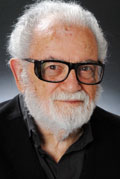The IndiePENdents.org does not sell any products or offer any services.
It consists of volunteers and it is set up to be totally transparent in its goals and actions.
Direct links to author websites or their books are included for your convenience.
For problems, questions, or suggestions regarding this website, please contact ideas@indiependents.org.
Copyright 2016 ©The indiePENdents Website created and maintained by Philip Catshill http://www.philipcatshill.com

Jasha M.Levi
 IN MEMORIUM.
IN MEMORIUM.
JASHA M. LEVI (1921–2013)
A TRIBUTE TO THE FOUNDER OF THE INDIEPENDENTS.ORG
Jasha M. Levi (1921–2013) was born in Sarajevo. Being Jewish, he soon felt the ripples of Hitler's rise to power in Europe. After taking part in student demonstrations which overthrew the pro-Nazi Belgrade government in 1941, he escaped capture by the German Quislings, and became a rubric in the Geneva Convention as Civilian Internee of War in Asolo, Italy. There he taught school to refugee children and took them to matriculate at the Venice Ghetto schools. After the fall of Mussolini in 1943, he was again forced to flee from invading German troops and lived underground in Rome until the liberation June 1944 . Back i
n Dalmatia, on the Adriatic Coast of Yugoslavia, he fought against the German troops until the end of war in Europe.
As a barely 24-year old Yugoslav news reporter, he covered the Paris Peace Conference in 1946. In 1948, he was appointed editor of the centre spread of the government daily Borba in Belgrade, dedicated to the Tito-Stalin rift. In 1951, Jasha M Levi reported from the Korean Peace Talks in Panmunjom and in 1953 received a permanent assignment to the UN and the White House. By that time, four of his books on foreign policy had been published in Serbo-Croatian.
In November 1956, with the cold war fermenting, and as a protest over Tito's refusal to support the Hungarian Revolution in the Security Council, presided at the time by the Yugoslav Ambassador, he sought political asylum in New York. This brought his moment of fame when reports of his defection reached a front page article in The New York Times. However, defection denied him his newspaper job, so he turned his hand to work wherever he could find it, starting as an electrician helper on a Wall Street brokerage construction, a draftsman for the renovation of a steakhouse and a hotel in Manhattan, freelancer for PARADE and The New Republic, toy salesman at Saks Fifth Avenue and eventually, as an embosser at the lowest rung of Recording for the Blind (RFB).
Later, as RFB's Associate Director, he introduced raised line drawings to accompany recorded textbooks and developed a 4-track, half speed system for economical cassette recording used also by the Library of Congress for the next 25 years, when wireless digital recording took over.
After retiring in 1948, he took to gardening, lecturing and writing about life in the turbulence of the 20th Century.
_With the increasing number of low quality books tarnishing the reputation of authors who chose to Self-Publish, Jasha M. Levi conceived
The indiePENdents.Org
to award the prestigious
indiePENdents Seal
to those self-published books in which the writing, editing and presentation are equal to or above the standards found in traditional publishing.
The exploding number of digital books on the market is not a sign of the demise of traditional print. The same titles are available on Kindle, Nook and other e-outlets that can be found in print as well. The majority of them, however, will not be found in libraries, schools, or even bookstores, which are losing readers who would love to browse and buy the books from them but are forced to turn to other sources. The problem isn’t the future of books but of publishers, libraries, schools and bookstores. It has several causes:
1. The great majority of today’s independent authors can’t get their manuscripts past publishing agents; the response to their queries, if they get one at all, is often negative, but they will mostly get a total rude silence. This is perhaps because potential publishers like to bet on proven money-makers or on celebrities, regardless of the literary value of new writings. As a result, more writers are abandoning the traditional publishing route and are self-publishing.
2. The next hurdle is provided by the bookstores themselves, even the so-called independent ones: They will not accept books of independent authors, regardless of their merit, unless they have a publisher.
3. Writers are thus blocked from public view by the subjective judgements of agents, publishers and traditional bookstores as to what they think will sell, rather than as to the literary and cultural value a book might have. Authors then go into self-publishing and the public has a choice to read them in digital or print form, but the books must be visible to succeed, and this forces authors to become marketers.
4. The avalanche of self-published books creates a problem of legitimacy. Therefore, a group of authors and editors formed a non-profit organization, The indiePENdents, with the purpose of establishing standards and promoting independent writers. We will try to enlist the support of Amazon, Barnes & Noble, LuLu and mainstream publishers in creating standards and awards.
Authors write books. They represent the future of our culture. The indiePENdents want to give the creativity of the self-published authors an imprimatur, so to speak, in order to achieve the respectability and credibility that they are not presently given by the industry. Books that meet the standards will be awarded the indiePENdents' Seal.







